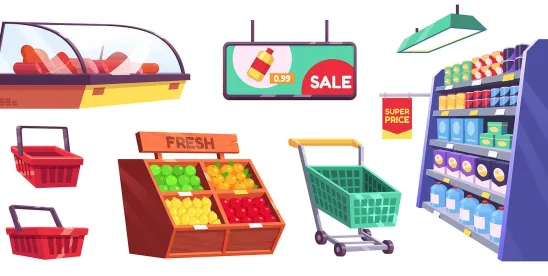In a significant move toward greater labeling transparency and state oversight of food policy, Texas and Louisiana have enacted new laws requiring special labels and disclosures for certain food ingredients. Aimed at informing consumers about substances banned or restricted in other countries, the laws mandate on-package warnings or QR code notices for products containing specified additives. These measures reflect a broader state-level push aligned with the federal “Make America Healthy Again” initiative and raise key legal and compliance considerations for food manufacturers and retailers.
Texas – SB 25
On June 22, 2025, Texas enacted SB 25, amending the Texas Health and Safety Code by adding Sections 431.0815 and 431.0816. The law imposes new labeling and online disclosure requirements for foods in Texas that contain any of 44 specific ingredients (full list available here). While the law takes effect on September 1, 2025, rulemaking by the Texas Health and Human Services Commission is due by December 31, 2025. The labeling requirements apply only to food products or labels developed or copyrighted on or after January 1, 2027.
The law applies to “food manufacturers” defined as “any manufacturer that offers a food product for sale in [Texas], regardless of where the product was originally produced.” Food manufacturers must include a warning label if a product contains any of the 44 ingredients. The required label must state:
“WARNING: This product contains an ingredient that is not recommended for human consumption by the appropriate authority in Australia, Canada, the European Union, or the United Kingdom.”
For food products sold online, both manufacturers and retailers (if the retailer is provided the warning information by manufacturers) must display a legible warning on their websites or otherwise inform consumers of the same.
Certain products are exempt, including those not intended for human consumption; food prepared in restaurants or retail establishments; USDA-regulated products; drugs; dietary supplements; and agricultural chemicals. Companies must document the basis for any claimed exemption.
Although SB 25 does not allow private lawsuits, the Texas Attorney General may seek injunctions and impose civil penalties of up to $50,000 per day per noncompliant food product. Courts may also order reimbursement of state enforcement costs.
Louisiana – SB 14
On June 27, 2025, Louisiana enacted SB 14, adding Sections R.S. 40:661 and 662 (Public Health and Safety) and R.S. 17:197.2 (Education) to its Revised Statutes. The law imposes labeling requirements for food products containing any of 44 specific ingredients (full list available here) and restricts the serving of foods with 15 “prohibited ingredients” in public and certain nonpublic schools.
Effective January 1, 2028, food sold in Louisiana containing any of the specific ingredients noted above must include a QR code with an adjacent statement directing consumers to scan the code for ingredient information. The code must link to a manufacturer-controlled webpage displaying the following:
“NOTICE: This product contains [insert ingredient here]. For more information about this ingredient, including FDA approvals, click HERE.”
The word “HERE” must link directly to the FDA’s food chemical safety webpage.
Certain products are exempt from this requirement, including FDA-regulated drugs and dietary supplements, certain alcoholic beverages, foods prepared and labeled in retail food establishments, and certain medical foods.
The law also requires food service establishments using any of eight defined "seed oils" to post the following disclaimer on menus or in another visible location:
“Some menu items may contain or be prepared using seed oils.”
Finally, starting in the 2028–2029 school year, public schools and nonpublic schools that receive state funds will be prohibited from serving food or beverages containing any of the 15 prohibited ingredients. However, foods sold in concession stands or vending machines are exempt.





 />i
/>i

